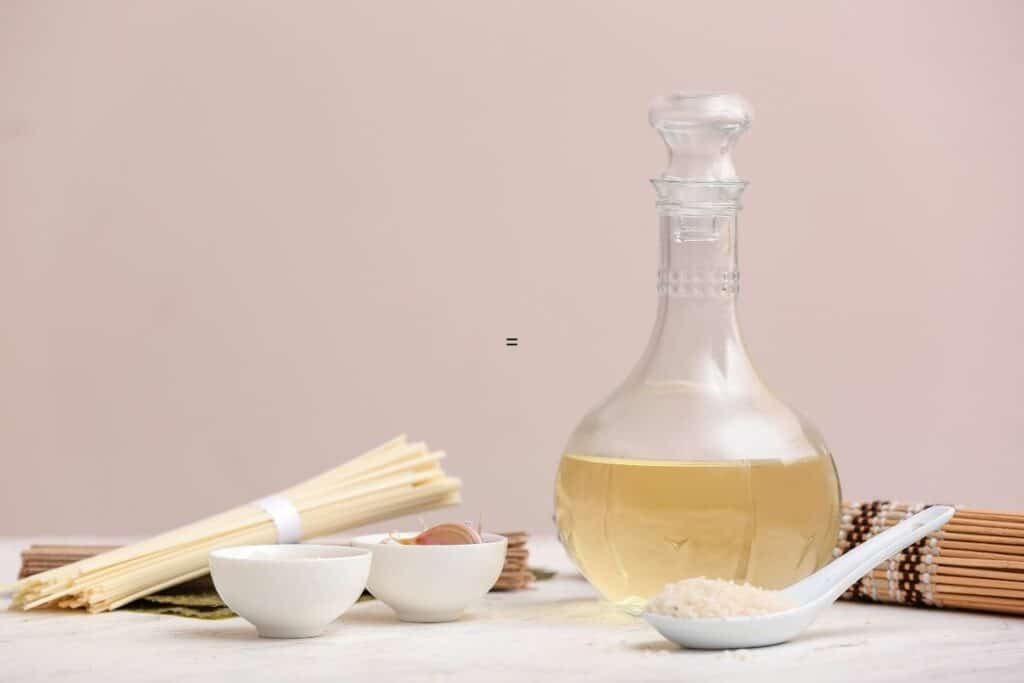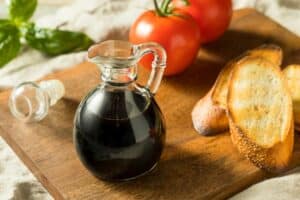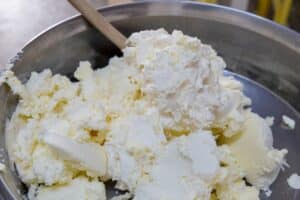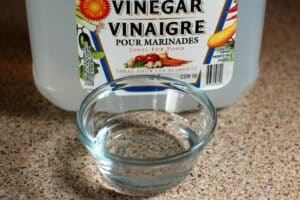Considered a gourmet wine vinegar, sherry vinegar is – as its name suggests – made from sherry, itself a fortified wine produced throughout the world.

Produced in the Spanish province of Cadiz – specifically within the triangular area between the city of Jerez de la Frontera, and the towns of Sanlucar de Barrameda and El Puerto de Santa Maria – the product is considered one of the most important creations within the so-called ‘sherry triangle’.
However, due to the rarity of this product, you will almost certainly find yourself looking for viable alternatives for cooking and dressing your food.
Luckily, we have put together a list of the 15 best substitutes for sherry vinegar – detailing what makes them so special.
These include: rice vinegar, wine vinegar, apple cider vinegar, lemon juice, and many more.
Below you can see a table comparing their nutritional values:
| 100ml Of | Calories | Fat | Carbs | Protein | Fiber | Ratio |
| Rice Vinegar | 12 | 0.5g | 2.6g | 0.5g | 0.5g | 1:1 |
| Red Wine Vinegar | 22 | 0.1g | 0.7g | 0.1g | 0.1g | 1:1 |
| Apple Cider Vinegar | 41 | 0.5g | 10g | 0.5g | 0g | 1:1 |
| Lemon Juice | 26 | 0g | 8.9g | 0.39g | 0g | 1:1 |
| Champagne Vinegar | 0 | 0g | 0g | 0g | 0g | 1:1 |
| White Wine Vinegar | 26 | 0.3g | 0.8g | 0.1g | 0.5g | 1:1 |
| Sherry | 116 | 0g | 1.4g | 0.2g | 0g | 1:1 |
| Balsamic Vinegar | 125 | 0g | 33g | 0.6g | 0g | 2:1 |
| Fruit Juice | 49 | 0.12g | 11.73g | 0.43g | 0.2g | 1:1 |
| Vanilla Extract | 12 | 0g | 0.53g | 0g | 0g | 1:1 |
| Worcesters-hire Sauce | 96 | 0.9g | 21g | 0.8g | 0g | 2:1 |
| Soy Sauce | 77 | 0g | 3.2g | 10.4g | 0g | 2:1 |
| Red Wine | 85 | 0g | 2.59g | 0.07g | 0g | 1:1 |
| White Wine | 83 | 0g | 2.58g | 0.07g | 0g | 1:1 |
| Plum Wine | 163 | 0g | 20.2g | 0g | 0g | 1:1 |
What Does Sherry Vinegar Taste Like?
Now that we know a little more about sherry vinegar, and the nutritional values of some of the best alternatives on the market, it is now time for us to examine what the product actually tastes like.
As you might expect, sherry vinegar has a very complex flavor profile – one composed of the bitter bite of the vinegar, and the sweetness and fruitiness of the sherry therein.
Generally speaking, it is made in such a way that the sweetness is the aftertaste within the concoction, with the main flavors being an overriding richness and nuttyness that has become synonymous with the style.
Of course, as a form of vinegar, sherry vinegar is also highly acidic, which does somewhat command the attention when it comes to flavors.
This is the aspect of sherry vinegar that also makes it widely used in cooking – allowing people to break down meat, tenderize it, as well as bring out the sweetness of seasonal garden vegetables like tomatoes.
Sherry Vinegar Nutritional Facts
Now that we know what sherry vinegar is thought to taste like, it is now time for us to look at the nutritional values that it has.
The nutritional value of 100 ml of sherry vinegar include:
- 19.6 calories
- 0.1 grams of protein
- 0.3 grams of carbohydrates
- 0 grams of fat
- 0 grams of fiber
Unfortunately, sherry vinegar only tends to be used in small amounts in cooking, which means that any health benefits that can be accrued from the consumption of the vinegar is likely to be minimal – if non-existent.
What’s more, sherry vinegar is obviously highly acidic, which means that it should not be consumed in large quantities – otherwise you run the risk of various digestive problems, tooth erosion, and numerous other problems.
Depending on the sherry that is used – especially in homemade sherry vinegar recipes – it could also be high in sugar. This is not a concern with dry sherry, but is certainly a factor with sweet sherry.
The Best Substitutes For Sherry Vinegar
Now that we know a little more about sherry vinegar, it is now time for us to examine the various substitutes in closer detail – taking note of what they can be used for, and what makes them so viable.
These substitutes are:
- Rice vinegar
- Red wine vinegar
- White wine vinegar
- Apple cider vinegar
- Lemon juice
- Champagne vinegar
- Sherry
- Balsamic vinegar
- Fruit juice
- Vanilla extract
- Worcestershire sauce
- Soy sauce
- Red wine
- White wine
- Plum wine
Rice Vinegar
First on our list, we have rice vinegar – a common condiment and ingredient used within Japanese cuisine, and one that has a long history within that part of the world.
Used as a seasoning, dressing, and as a dipping sauce within east Asian cuisine, it also has numerous variants that can be consumed as a drink by themselves – although this is a less common use for the condiment.
While known as a ‘vinegar’, the flavor is much more mild than western vinegars, possessing much less acidity than would perhaps be expected.
As such, this makes it a great addition to all forms of cooking, and means that the flavor of the food is at a lower risk of being contaminated by its addition.
Perhaps most commonly, Japanese rice vinegar is used in the process of sushi making, where it is added to the rice to make it firmer and more likely to stick together for rolling.
Red Wine Vinegar
Next on our list, we have red wine vinegar – a common condiment and ingredient used throughout the world, and one that has numerous applications within cooking.
Good quality red wine vinegar should have a pronounced, tangy, fruity flavor that is both complex and delicious – making it great as an addition to French and Mediterranean cuisine, as well as various elements of Spanish cuisine too.
There are also numerous health benefits associated with red wine vinegar, including balancing blood sugar, lowering blood pressure, lowering cholesterol, protecting the quality and vitality of the skin, aiding weight loss, and being beneficial towards all manner of chronic diseases and age-related conditions – due to the high levels of antioxidants found within.
However, what makes it so popular is the rich flavor, which really lends itself to all manner of different cuisines from around the world, and helps to make any dish complex, alluring, and totally moreish.
White Wine Vinegar
Next up we have white wine vinegar – a condiment and ingredient that could be considered the antithesis of its red wine counterpart, and one that has many different uses within world cuisine.
With a much more sour taste and flavor profile, white wine vinegar is used much more sparingly within cooking, due to the fact that the taste is so strong, and the consistency is so highly acidic.
Some of the most common uses for white wine vinegar include the production of sauce (such as bechamel sauce) marinades, as well as dressings for salad, fish, and meat.
As with red wine vinegar, there are also numerous purported health benefits that have become associated with the condiment.
These include balancing blood sugar spikes, controlling the appetite, improving and bolstering heart health, as well as the potential to shrink and even reduce the probability of tumors forming within the body.
Perhaps the most versatile of the two wine vinegars, white wine vinegar has countless uses within cooking, and is even used (in its household form) as a natural cleanser and disinfectant.
Apple Cider Vinegar
Perhaps one of the most famous forms of vinegar on this list – at least in modern times – is apple cider vinegar.
This has long been used for all manner of purposes, ranging from a condiment, an ingredient in cooking, as well as a popular cure-all throughout much of our extended history.
However, while the latter statement might sound far-fetched, the popularity we are seeing surrounding apple cider vinegar in recent times is more to do with the health benefits that it has, rather than its tart taste.
Most notably, apple cider vinegar has uses as an appetite suppressant, which can be used as a healthy and natural weight loss aid.
Another benefit is that it is effective at balancing blood sugar, and stopping the harmful blood sugar spikes that, when occurring frequently enough, can result in the onset of type 2 diabetes.
This has meant that the vinegar has become a much sought after health supplement, where its uses and versatility have made it one of the most popular products in the current decade.
Lemon Juice
Of course, a common and widely used ingredient within cooking is lemon juice – and there are nearly countless dishes that it can be added to.
Used throughout the world in a number of different ways, lemon juice can not only be used to add sweetness, sourness, tartness, and freshness to meals, but it can also be used within cocktail making, within baking, and within the creation of salad dressings, sauces, and marinades.
Perhaps most notably, lemon juice is often used as a condiment with fish and seafood – where the bitterness of the lemon really helps to unlock the often salty, meaty flavors of the fish and shellfish.
Most common uses include using lemon juice on cod and salmon, although it can really be used on any fish to enhance the natural flavors.
Champagne Vinegar
Another substitute, and perhaps one that is less known than some of the others on this list, is champagne vinegar – a popular condiment and ingredient that, while sounding extravagant, is very similar in essence to white wine vinegar and other varieties.
Once again made with a ‘vinegar mother’, and typically combined with Chardonnay or some other form of sparkling white wine, champagne vinegar is characterized by its botanical, mild, and floral flavors.
Particularly popular within French cuisine, champagne vinegar can make a great alternative to sherry vinegar – especially if you are looking for something light, fresh, and tasty.
Sherry
Of course, instead of adding sherry vinegar to your cooking, you could always just go right to the source.
Sherry has long been used within cooking and baking, and the richness of the flavor and alcohol content can really enhance meat, baked goods, and all manner of other dishes.
Like most kinds of fortified wine, it is characterized by a rich and complex flavor, which can be used to create some interesting and sophisticated flavor combinations with the right knowhow and understanding.
Balsamic Vinegar
For creating dressings and salad condiments, a common variety is balsamic vinegar, and depending on the dish you want to make, this can be a great substitute for sherry vinegar.
Milder in acidity, and with a complex and wholesome flavor, balsamic vinegar can be great for topping salads, and including in all manner of other dishes.
Fruit Juice
As with lemon juice, it is not uncommon for other forms of fruit juice to be added to cooking – not to mention being used for marinades, sauces, and dressings.
This could be orange juice, tropical juices, strawberry juice, mixed berry juices, and all manner of other fruits, and the one you choose depends entirely on the finish you want.
Of course, not every fruit juice is suitable for all dishes, and most of them are mainly used within baking rather than cooking – however, if you are looking for a jolt of sweetness, tanginess, or zest, then this can be a great alternative.
Vanilla Extract
Another common ingredient in cooking is vanilla extract, and this can surprisingly be a great substitute for sherry vinegar – bringing together the same combination of sweetness and bitterness to create a rich and complex flavor.
The uses for vanilla extract are endless, and it can really help to enhance any number of dishes from a number of different cuisines.
Worcestershire Sauce
Perhaps more common within the UK, Worcestershire sauce has also made somewhat of a splash in the US in recent years – offering a salty, rich, yeasty, complex flavor that can really be used to bring the best out of numerous kinds of dishes.
Great atop meat dishes, or with tomato-based Italian sauces, this is a great way of increasing the flavor potential, adding a little kick, and generally creating a more sophisticated flavor profile for the meal you are making.
Soy Sauce
Popular within Asian cuisine, soy sauce can be a great addition to a meal – not to mention a good substitute for sherry vinegar.
While offering a different flavor to sherry vinegar, one thing that soy sauce does do is bring a bitterness, saltiness, and a complexity to the foods it is added to – which when compared with sweeter and richer foods, can even mimic the flavor profiles that a rich tasting vinaigrette can create.
Red Wine
Of course, you could also just add a splash of red wine to your cooking?
This has been a part of cooking for centuries, and is probably one of the simplest and easiest alternatives if you don’t happen to have any sherry vinegar to hand.
You can be a little more liberal with the red wine than other items on this list, and this makes it great for amateur cooks.
White Wine
You could also use white wine – another easy to obtain ingredient, and one that can be used equally as liberally as red.
Great for adding a little sweetness and fruitiness to cooking – not to mention being useful within the creation of sauces and marinades – white wine has numerous uses, and is widely affordable.
Plum Wine
If you are looking for a richer taste more akin to sherry vinegar, then you could always try plum wine.
While being more common in east Asian cuisine – and somewhat harder to find in rural America – it can be a great ingredient to invest in, especially for those who enjoy complex flavors.
Popular Recipes That Call For Sherry Vinegar
Now that we have looked at some of the most viable alternatives to using sherry vinegar, it is now time for us to examine some of the most popular recipes that utilize these components.
The best part of these recipes is that they are versatile, and allow for many of these substitutes to be used in their place.
Sheet Pan Tarragon Chicken W/ Sherry Vinegar Onions
First we have this recipe for tarragon chicken with sherry vinegar onions – a moreish, wholesome, and comforting dish that perfectly combines sweetness, saltiness, herbs, spices, and a complexity that is seldom found in modern cuisine.
Perfectly balanced, this dish can quite easily be switched up with any of the substitutions on this list.
Sherry-Shallot Vinaigrette
If you are looking for a simple yet delicious vinaigrette to use on salads and vegetables, then why not try this recipe?
While it does rely on sherry vinegar first and foremost, it does offer the perfect template upon which you can experiment with flavors and combinations.
Sherry Shrimp With Garlic
This is another dish that is open to manipulation and experimentation, and you could quite easily create a number of different varieties of this dish by simply substituting the sherry vinegar for other alternatives.
Final Thoughts
It is certainly true that, within modern cuisine, we have never had more access to ingredients – with even the more unusual aspects of cooking being within grasp.
However, as this article shows, even the most unique ingredients have numerous viable alternatives, allowing those with specific requirements to enjoy their food to its fullest.
Frequently Asked Questions
Now that we know a little more about sherry vinegar, and some of the best substitutes on the market, it is now time for us to answer some frequently asked questions that you might be interested in.
No, sherry vinegar is not considered expensive, and is usually found for under $10 a bottle in most larger supermarkets and grocery stores.
Yes, due to the product being made and exported from Spain, it can be difficult to locate in some parts of the world – especially in more rural regions with less global produce.
This is why there is such a need for viable substitutes.







